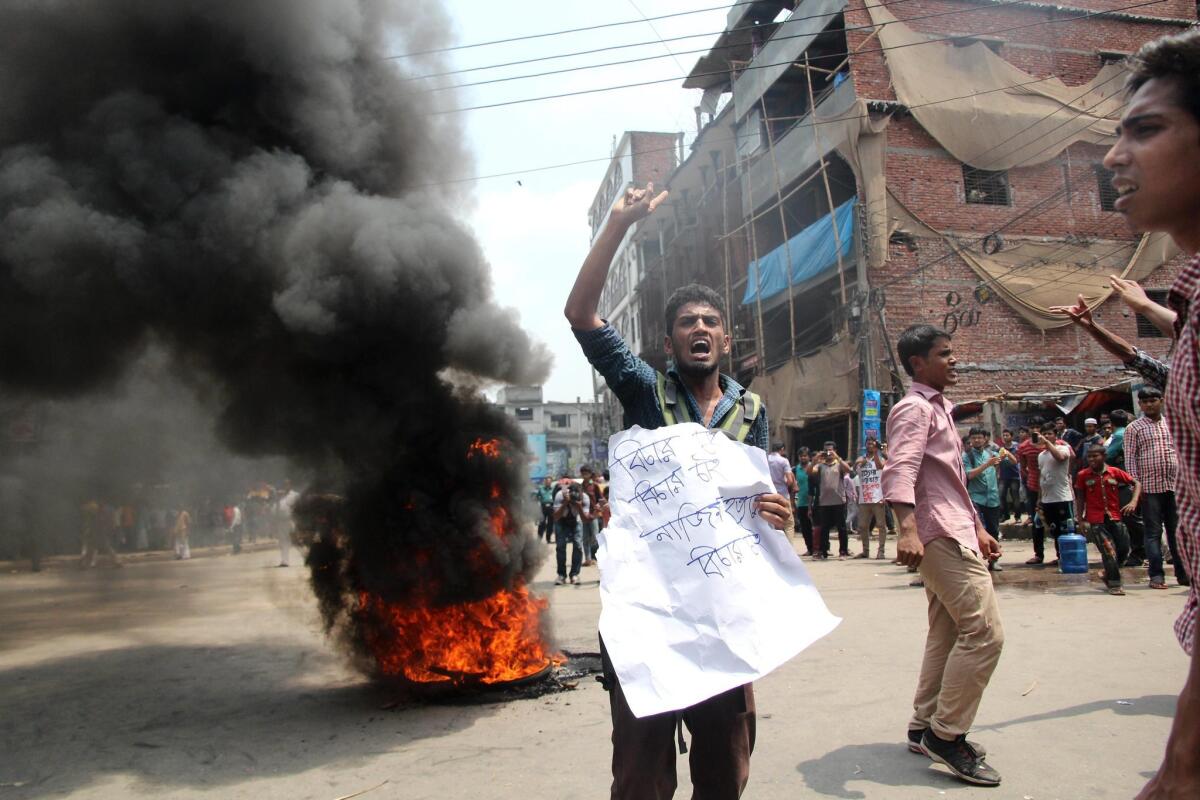Student slain in Bangladesh criticized religious extremists on Facebook

Demonstrators set fire to bicycle tires as they protest the slaying of law school student and online activist Nazimuddin Samad in Dhaka, Bangladesh, on April 7, 2016.
- Share via
reporting from Dhaka, Bangladesh — On his Facebook profile page, under religious views, Nazimuddin Samad wrote: “I have no religion.” In other posts, the 27-year-old law student wrote against religious extremism and criticized radical Islamists.
Those views may have been enough to get him killed.
Police in Bangladesh on Thursday identified Samad as the victim of a gruesome slaying in the capital, making him the latest person to be killed in the South Asian nation allegedly for criticizing fundamentalist Islam.
Despite domestic outrage and international concern, Bangladesh seems unable to prevent the grisly killings of secular voices, apparently at the hands of religious fundamentalists. In this overwhelmingly Muslim nation of 160 million people, which has long been described as favoring moderate Islam, at least four secular bloggers and one publisher of secular writings have been killed since 2015, allegedly by Muslim extremists.
Samad was attending law school in the evenings at state-run Jagannath University in Dhaka. His assailants, who were still at large, intercepted him as he was walking along a road with a classmate in Old Dhaka around 9:45 p.m. Wednesday, said Dhaka Metropolitan Police Deputy Commissioner Nurul Islam.
Witnesses said between three and six armed men surrounded Samad at an intersection and began hacking him with machetes, in a similar fashion to the bloggers who were previously killed. Samad fell to the street and the attackers shot him before fleeing. Police said they recovered a bullet shell from the scene.
Citing witnesses, police said the assailants chanted, “Allahu Akbar,” or God is great, as they attacked Samad. Samad’s classmate told law enforcement officials that the suspects were dressed in everyday clothes and melted into a crowd of bystanders after the attack.
Samad was rushed to a hospital, where he was pronounced dead.
Samad, who hailed from the western district of Sylhet, was the information and research affairs secretary of Bangabandhu Jatiya Juba Parishad, a group affiliated with the governing secular Awami League party.
Jagannath University students held a protest Thursday in response to Samad’s killing, blocking a street outside the campus in Old Dhaka.
Members of a banned militant group, the Ansarullah Bangla Team, which maintained a “hit list” of secular writers, have been arrested in connection with previous slayings, including that of Avijit Roy, a naturalized American citizen who was attacked along with his wife outside a book fair in Dhaka in February 2015.
In December, two men were sentenced to death for the 2013 killing of Ahmed Rajib Haidar, a blogger who campaigned against Islamic fundamentalism, the first verdicts handed down after a spate of killlings of writers in Bangladesh.
PEN America, an association of writers promoting free expression, condemned Samad’s killing and renewed calls on the Obama administration to offer shelter to Bangladeshi writers believed to be at risk.
“We urge the Bangladeshi police and other authorities to do everything in their power to investigate and prosecute this vicious attack on free speech and thought, and halt this terrible pattern of murders,” the group said in a statement.
“We also reiterate our demand for the United States and other countries that are able to provide refuge to shelter those writers who are still at grave risk before more lives are lost.”
Kader is a special correspondent. Staff writer Bengali reported from Mumbai, India.
Follow @SBengali on Twitter for more news from South Asia
More to Read
Sign up for Essential California
The most important California stories and recommendations in your inbox every morning.
You may occasionally receive promotional content from the Los Angeles Times.











